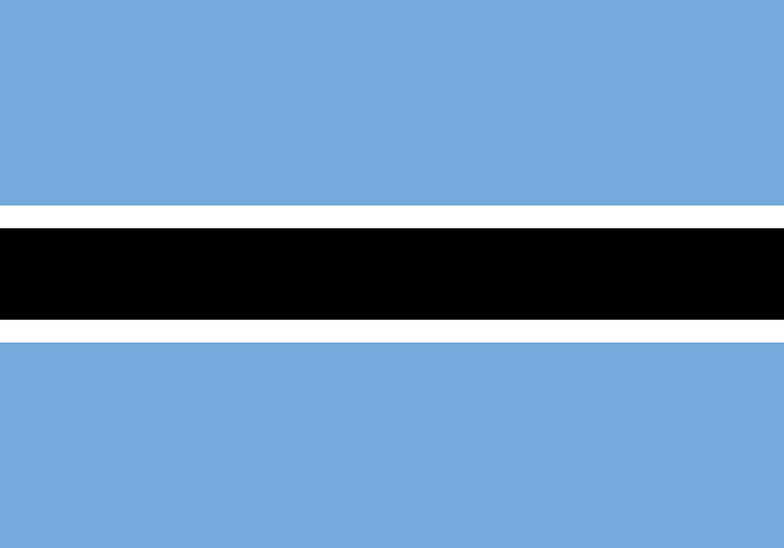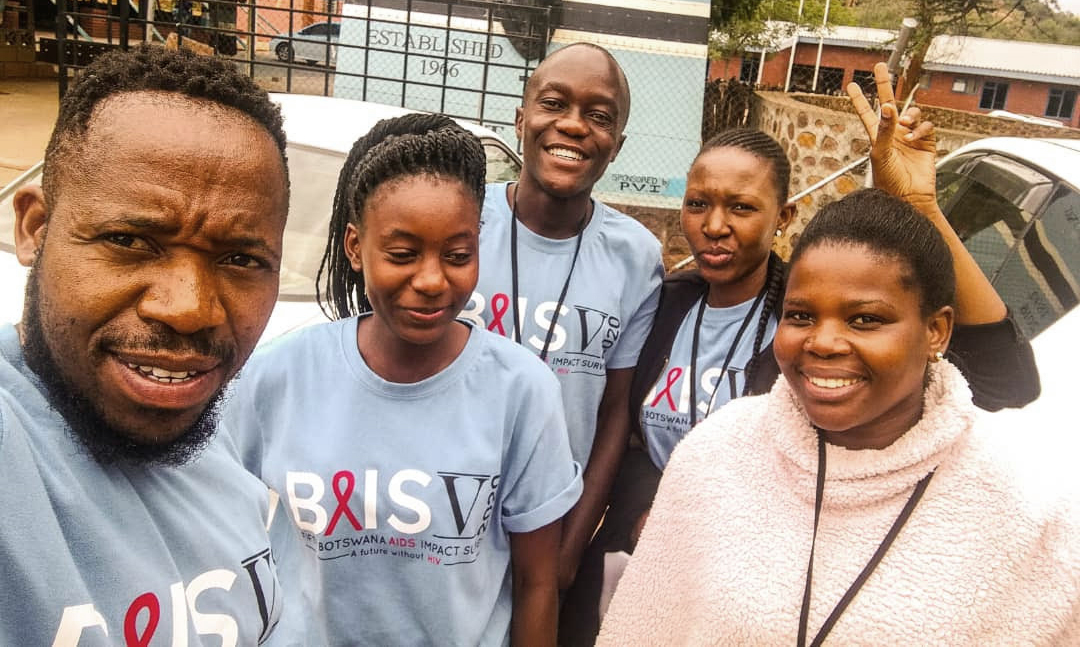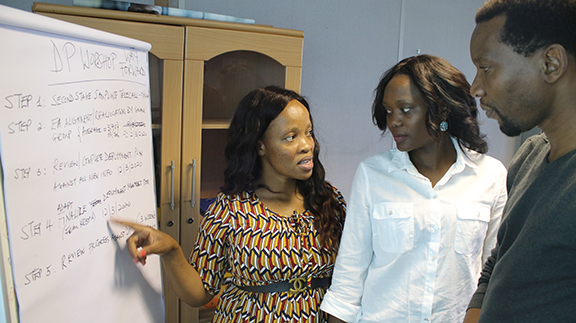Botswana
In Botswana, Ciheb has been supporting services through the entire cascade of prevention, HIV testing, linkage to care and treatment, and support for adherence and retention. In early 2015, Ciheb created the Botswana-University of Maryland School of Medicine Health Initiative (Bummhi). The initiative has been working with the Government of Botswana in achieving epidemic control of HIV and is providing training and support at clinical sites throughout the country.
Bummhi has been locally incorporated as an independent organization. Ciheb in Botswana continues to work alongside Bummhi in carrying out its mission.
Projects
Botswana Smoking Abstinence Reinforcement Trial (BSMART). Proposed to use a type 2 hybrid effectiveness-implementation study design to evaluate the effectiveness and implementation of a well-established Screening, Brief Intervention, and Referral to Treatment intervention consisting of the 5As (Ask, Advise, Assess, Assist, Arrange) delivered by trained lay health worker case managers, followed by referral to treatment with varenicline (a medication demonstrated to be effective for smoking cessation among people living with HIV/AIDS and on the list of covered medications in Botswana) prescribed and monitored by trained nurse prescribers-dispensers in the network of outpatient HIV care facilities in Botswana.
The specific aims are to:
1. Assess the Reach and Effectiveness of BSMART.
2. Assess the Adoption and Implementation indexed by quality and consistency of intervention delivery.
3. Assess whether the intervention becomes Maintained as part of routine practices.
4. Determine the preliminary cost-effectiveness of BSMART

COVID-19 International Vaccine Implementation and Evaluation Program (CIVIE). CIVIE aims to ensure that low- and middle-income countries can effectively implement and evaluate COVID-19 vaccination programs to establish and strengthen sustainable programs for immunizations across the lifespan.
The Government of Botswana implemented Phase 3 of their COVID-19 vaccination response in September 2021, with the vaccination of persons aged 18-29, and Phase 4, beginning December 2021, with the vaccination of persons under the age of 18 years. Although COVID-19 vaccines were readily available in the country, as of March 2022, only 63% of the total population were fully vaccinated, with 73% receiving at least the first dose.
Ciheb, in collaboration with Bummhi, was awarded a CIVIE grant to develop toolkits to support healthcare providers in addressing vaccine hesitancy. The team identified key messages and information needed to create effective toolkits through a qualitative study employing a series of focus group discussions conducted in healthcare settings and in the community with vaccinated and unvaccinated individuals. The tool kits were then tested with additional focus group discussions, modified based on feedback, and delivered to the MOH for deployment to all districts in Botswana. The team will evaluate the toolkits to assess increases in healthcare worker self-efficacy in discussing COVID-19 vaccination with their patients and addressing concerns that drive vaccine hesitancy before and after training on the toolkit and resources.
Continuous Quality Improvement

Botswana
Implementing CQI programs in Botswana
Previous Projects
Fifth Botswana AIDS Impact Survey (BAIS V)
Fifth Botswana AIDS Impact Survey (BAIS V). Preparation for the BAIS V began in 2019. This Centers for Disease Control and Prevention (CDC) survey is among the ongoing Population Based HIV Impact Assessments (PHIAs) being conducted in select nations. BAIS V is a cross-sectional, household-based, nationally representative survey that is assessing the prevalence of key HIV-related health indicators such as incidence, prevalence, viral load suppression, and risk behaviors and will describe uptake of key HIV prevention, care, and treatment services.
This two-stage cluster survey of 13,545 randomly selected households in Botswana will include 28,789 eligible participants aged 15-64 years, of whom 24,154 are expected to participate in an interview. From this group, 21,142 are expected to participate in a blood draw and HIV testing. In addition, the survey expects 3,762 children aged 6 weeks to 14 years born from HIV-positive mothers and mothers of unknown HIV status to participate in the blood draw and HIV testing. The total number of expected participants in the blood draw and HIV testing is 24,904.
From September 2, 2019 to March 17, 2020, the BAIS V team was preparing for survey implementation. Following the onset of the COVID-19 pandemic, the BAIS V steering committee paused the survey. Preparations for restarting the survey in a COVID-compliant manner are underway, with a view to resuming once a date is agreed upon by the Government of Botswana, Ciheb, and CDC.
Botswana Partnership for Advanced Clinical Education (BPACE)
This initiative supported 52 high-volume facilities of the Botswana Ministry of Health and Wellness in 12 districts in providing care and treatment services.
The grant is supporting more than 120,000 clients on treatment across the current 52 healthcare facilities. More than 30,000 HIV-positive individuals have been newly enrolled on antiretroviral treatment (ART) since the beginning of the program.
BPACE has supported the implementation of key strategies to attain the UNAIDS 95-95-95 targets. These include supporting health facilities to improve processes that strengthen the care continuum from HIV testing to linkage to care. In the past year, 92% of all newly diagnosed HIV infected people have been initiated on ART, with nearly 60% starting ART on the same day of diagnosis. Of the 118,000 people supported on treatment, 98% are virally suppressed. Through the BPACE program, Ciheb has partnered with three district health management teams to expand HIV services access through facility-led outreach mobile services to underserved communities in hard-to-reach areas and to target HIV service outreach for men within the community.
BPACE has continued to support personnel at health facilities to strengthen the delivery of client-centered services, including facility case tracking officers and expert clients. The latter are persons who are HIV positive and have openly declared their status. These personnel have assisted in providing services at all 52 supported facilities.
Expert clients have provided peer navigation, health talks, and psychosocial support to newly diagnosed HIV infected individuals to support linkage to treatment. In addition, they have followed patients who have missed appointments or defaulted from care and treatment and returned them into treatment. They have maintained appointment systems for viral load blood draws to contribute to high viral load testing coverage. Throughout the implementation, the indicators for retention, viral load coverage, and viral suppression have remained above 97%.
The prevention of mother-to-child transmission continues to have high testing and treatment coverage for over 99% of clients, with mother-to-child transmission holding at 0.6% throughout the year. The BPACE program has also supported the national program towards pre-validation for the elimination of mother-to-child-transmission of HIV.




